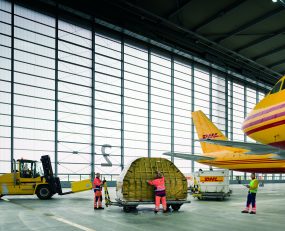
Deutsche Post-DHL has released what it calls ‘preliminary results’ for the second quarter, possibly in response to the uncertain economic climate. It seems that the company wants to communicate the good news that it is growing, profitable and has a better view of its near-term future prospects.
Although these are not audited figures and appear rather equivocal, DP-DHL Group reports that its underlying profits have grown over the period. Earnings before Interest and Tax (EBIT) rose by 16% year-on-year to €890m, although this number is complicated by a number of exceptional items. Stripping these out, DP-DHL claim profits grew by 25% year-on-year.
Looking at the results from the individual divisions, all parts of the DP DHL Group seem to be growing strongly. Operational profits at DHL Express increased by 7.5% year-on-year hitting an EBIT of approximately €560m, whilst Global Freight Forwarding & Freight saw a 53.2% jump. Post & Parcel Germany operational profit was 46.9% higher at €260m. Looking at the volumes of parcels and cargo handled, it seems that these businesses have been able to exploit the recover in locations such as China as well as sustain or improve operational margins.
The exception was DHL Supply Chain which was hit by write-offs. Although the business was still in the black at €30m this represented a drop of 65.5%. The nature of the write-offs may have been illustrated by the parallel announcements of job reductions of approximately 2200 at its operations at Jaguar Land Rover in the UK.
Frank Appel, CEO of the Group emphasised that DP-DHL had succeeded; “we have navigated our company through the crisis very well” announcing a bonus of €300m for each employee. He also articulated earnings guidance, something which the company was unable to do earlier in the year. For 2020 DP-DHL expects to earn an EBIT of between €3.5 and €3.8bn, whilst 2021 will see anywhere between €5.3bn and €4.7bn depending on the strength of the recovery.
Overall, the Group seems to have recovered well from the shock of the crisis in the short-term. Possibly one of the questions for the longer-term is how effectively it will be able to adapt to structural change in areas such as automotive logistics.
Source Transport Intelligence, 09 July, 2020
Author: Thomas Cullen